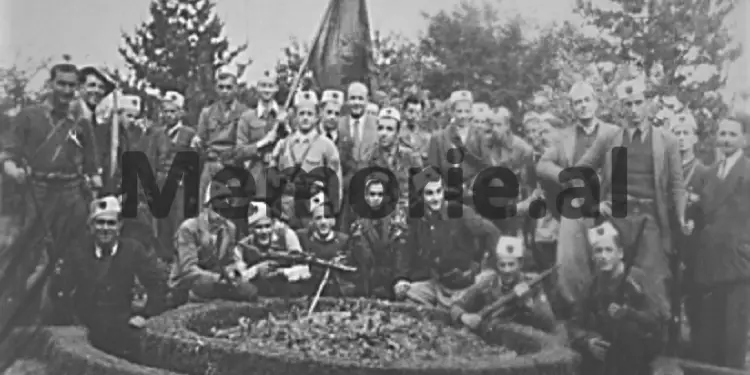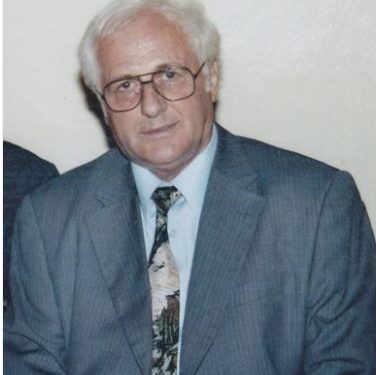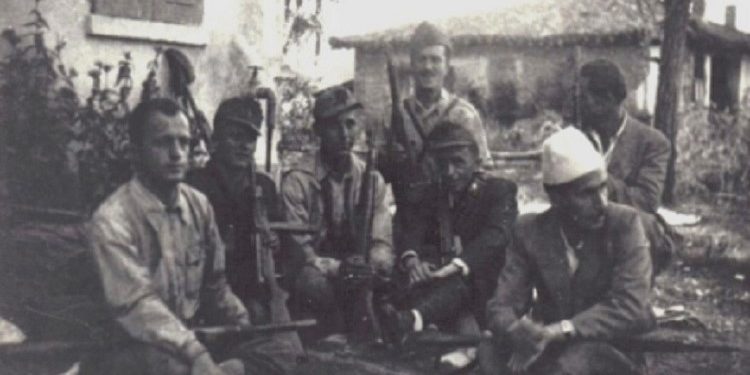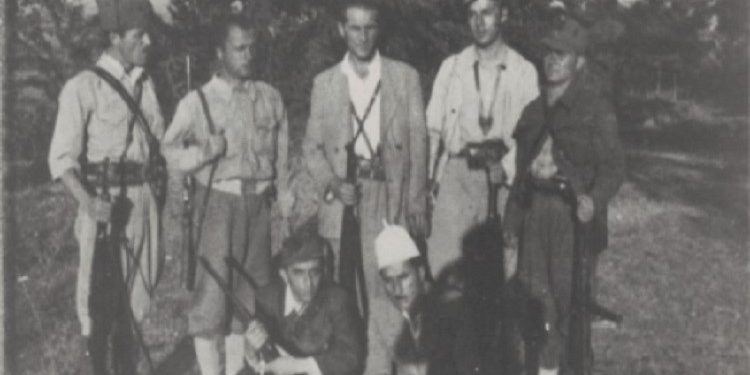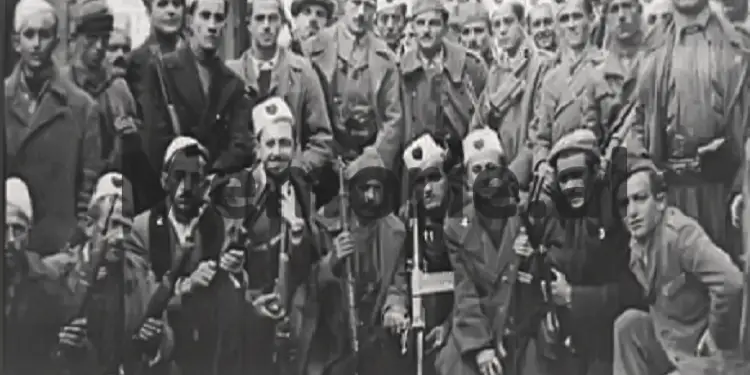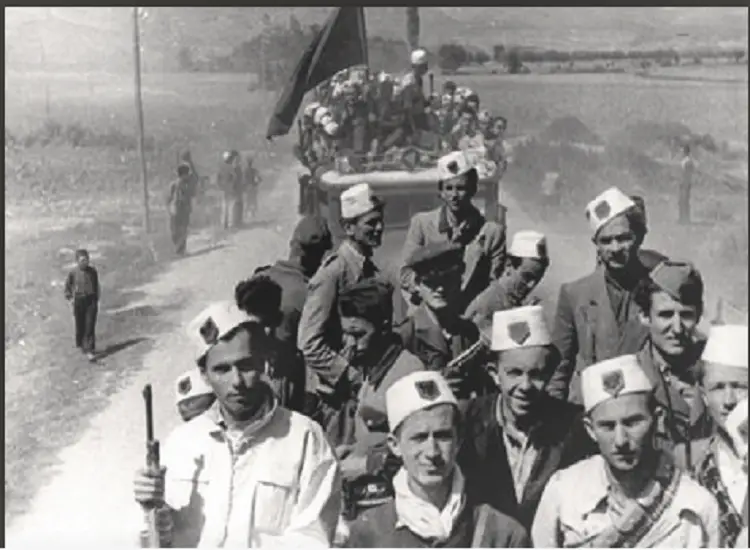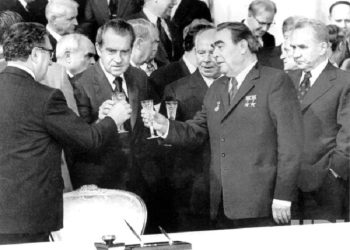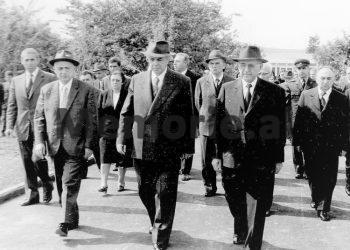From Esat Choku
-Homage on the occasion of the anniversary of the reburial of 67 innocent people shot by Mehmet Shehu, in Matjan of Lushnja-
Memorie.al / The massacre that Mehmet Shehu committed in the village of Matjan in Lushnja (some call it the massacre of Garunjas, some of Golem), in October 1943, is one of the most savage in the history of the Second World War in Albania and contradicts historiography communist, who claimed for 50 years, that; The National Liberation War did not have a fratricidal character, but was a movement for national liberation. The massacre preceded the civil war, where the seizure of power was the main goal of the Communist Party, which instead of fighting the occupier, incited hatred and turned the gun on the nationalist brothers.
That day cannot be removed from my memory, even though 20 years have passed. We climbed with difficulty towards Maja e Shkujka, to go to the place where the massacre took place, in the village of Matjan (in fact, as a place of residence of the “enemies”, it was never called a village, because they left it anonymous, for the sake of biography. ) The ascent is steep and the feet slip from the rocky ground. Although it does not exceed 200 meters, Shkujka seems unreachable, if you take into account its ascent, from the plain to the hilly level. This is also called the “Hill of the Sign”, of taking a sign.
In fact, it is a dominant hill of Lushnja’s Daresë, it has been strategic in the clashes of the invading or transiting armies. It is a designation you may encounter in military topography. While the locals break down the toponym “Shkujka” differently – The water went away; the water went. The village at the foot of the hill, Shegasi, has a lot of pomegranates, but no water. Once the water exploded on top of the hill, but the shepherds, according to the legend, filled the bursting well with their sheep and wool and from that day, the water went from those hills.
Precisely in the distant autumn of 1943, on the serpentine road that twisted between the rocky massifs, the column of the boys of Myzeqe, who had accepted the call of the “National Front” to liberate the homeland, was also dragged. They were disarmed in the Golem Village and handcuffed like that, barely able to climb up the hill to catch their breath. Where were they taking them? No one knew! It was whispered that the terrible Mehmet Shehu, the commander of the Partisan First Assault Brigade, was waiting for them there.
Those who accompanied them did not tell them anything, but they were told that; they would take them there to the partisan headquarters. When we got to the top of the hill, and looked down on the plain of Myzeqe, it seemed to us that we were standing on a giant balcony, where the eye could see behind the plain and the hills of Gërmen, the blue of the Adriatic Sea.
At that time I was leading the Association of the Politically Persecuted of Lushnja. I was also part of the Pluralist Executive Committee. The secretary of the Pluralist committee, journalist Dalip Greca, was with me. He was part of that area and knew well the terrain, the people, and the tragic event that had happened. His village was a neighbor of the Matjans. His contribution to that reburial was appreciated by the Society of the Persecuted. The residents of Matjani gathered quickly as soon as we got down to the village. Met Matjani and Faik, they give us hospitality. Other neighbors had also come, having just heard about the purpose of our visit there.
An elderly lady told us: “I was a newly arrived bride when the massacre happened. At night, dogs and wolves howled with blood. The village was surrounded by forests. It was a warm autumn when those poor people were killed. At that time, we brought the cattle to rest at home until afternoon and let them out again, in the woods and meadows. I was also driving the cattle together with my brother-in-law. They had done the slaughter, but we heard a prolonged groan, which made us sick to our hearts. The poor man had lost his spirit and he, the wild commander, had ordered a partisan maid, that moaning is disturbing my sleep. What are you waiting for? A gunshot was heard and the voice was heard…”!
One of the elderly told us: “There were more than 200 ballistic prisoners that the partisans had brought before the commander Mehmet Shehu. Some of those who had acquaintances in the ranks of the partisans escaped; others were called: Whoever joins us, his life is spared. In the ranks of the ballistas, there were also young people aged 16-17, there were also 65-year-olds. Most were over 20 years old. Some were waiting for the wedding day, some had left the brides at home, others the children.
Most of the ballistas had turned their eyes to Rakip Xhepa. Mehmet addressed to him: Join us? – ‘I’ll become a pig and a communist, No!’- replied Rakipi. That was all it took and the crimes had claimed the lives of innocent Albanians. 67 innocent lives were lost. For 45 years, all the families of the murdered were treated as families of the “class enemy”, where the biography destroyed other lives, left hundreds of young people uneducated, and served as a contingent to fill the prisons.
Honoring the victims
Albanian society had not yet been freed from the nightmare of communism, when the Association of the Politically Persecuted of Lushnja, together with the Pluralist Committee, made the decision to honor the victims. It took a strong confrontation, with the association of Veterans of the district, who continued to call the gunned down “enemies”. Argued until midnight, but they did not give way. They even warned that the city would be against us on the day of the burial of the bones and that they would work against it. We tried to convince them, but when we saw that everything was in vain, we also forwarded the decision of the Pluralist Executive Committee of the district, that the burial would take place next to the plot, where the Martyrs Cemetery of the district was.
This decision angered them even more. They abandoned the meeting that was organized in the office of the secretary of the Executive Committee, a task that at that time was performed by Dalip Greca. We didn’t back down. The team of the association, led by Esat Çoku, chairman and supported by Vasil Sylari, Hajdar Xhafa, Naim Staravecka, Sherif Kaloshi, Njiazi Bylykbashi, and others, did not back down, even when the veterans warned, that they would do everything that this activity to fail. In the debate with them, I remember that I said to them: “You are not accepting the reconciliation of the dead, but how will you reconcile with us the living, who have imprisoned and persecuted us”?!
After we collected the remains of the shot dead, put them in coffins, brought them down to the city, requests from the relatives of the victims poured in from all sides: “Let us mourn them in our homes for one night”! Most were from Divjaka and Çerma. We gave it to them. It was a painful encounter, between the living and the dead. An extraordinary solidarity of the citizens of Lushnja, Divjaka, Çerma and the surrounding areas. They went and comforted and wept with laws according to custom.
No one had wept for them at the time of their death. They had buried them like animals, on a hillside, opening a large pit there among the Matjans. A commemorative meeting with a large participation was organized in the center of Divjaka by the Association of the Persecuted, supported by the Democratic Party and the Republican Party.
At the top were; the anti-communist doctor Ihsan Çabej, Seit Prishta, Jovan Rudha, Llazar Sako, Perikli Sota, Xhevit Çela, Gëzim Hajdari, Ilir Zhiti, Hajdar Qerreti, Ylli Sefa, Fred Haxhiu, Liliana Beçka, and many others. A literary montage presented by Perikli Sota, brought the crowd to tears. TV reporter Viktor Davidhi filmed the entire procession. The newspaper “Ora e gavasa” wrote the reportage of the ceremony. I want to single out the contribution and support of the leadership of the District Executive Committee, Fetah Elezi – chairman, Seit Prishta – vice-chairman and Dalip Greca – secretary. They were one with the Association of Former Persecuted and Political Prisoners, in all phases of the ceremony, the designation of the burial place, the release of funds and everything else.
February 11th and the lack of apology!
The day of February 11 was special in the city of Lushnja. The main town square was too small to hold that entire crowd. 67 coffins, led the march towards the Martyrs’ Cemetery hill, where those who were considered “enemies” would be buried. Lushnja of persecuted tribes; Sefaj, Korresh, Çelaj, Djindol, Murriz, Sinaj, Kirç, Matjan, etc., together with the persecuted residents of the former internment camps of Gradishta, Grabiani, Savra, Gjaza, Pluk, Çerma, etc., had descended it day in the square, not for revenge, but for the dignity and honor of the victims.
How many flowers the gardeners had brought that day of death! From the loudspeakers placed on the pillars of the road, the appeal was heard, name by name, of 67 men who, unjustly declared “traitors”, were returning to the bed of glory that had been absent for 48 years. I remember that in the follow-up speech, I apologized to those present, that to start that follow-up speech, I had borrowed an expression of Father Anton Harapi, when he was conveying the remains of Çerçiz Topulli and Muço Qulli, in 1936:
“Stop the men of Gjirokastra, Shkodra has a word with you”! I wanted to address this call today before we put these coffins in the ground, even to those martyrs who were punished with bullets, without committing any crime. I also wanted to convey that word to our martyrs, who were punished because they fought for ethnic Albania, unlike the communists, who wanted an Albania, without Kosovo and Chameri, in friendship with the Slavs”.
And I opened my heart to the weeping crowd. The funeral ceremony was magnificent. The veterans watched us from afar. They did not feel good, that the “enemies” announced by them were buried next to the martyrs. We had actually reconciled the dead, but not the living. Even today we do not feel reconciled! How will I feel like this, when in the Albanian Parliament, together with me, as a member of the Democratic Party, there was also the member of the Socialist Party, my former investigator?! How would my family feel, that for 45 years, they were imprisoned and exiled in prisons and did not a little, but 70 years, my father, my two brothers and I?!
Not even my interrogator once said “I’m sorry”, even out of formality or human courtesy. I was waiting for this apology, for him to pronounce it from the floor of the Assembly, but no, he didn’t have the courage. Not even when I asked him to. How will we feel reconciled, where all the former and sons of the “Block” are still looking for revenge, in the ranks of the Socialist Party? How will Albania be freed from the terrible yesterday, when the last Minister of the Interior from the time of the dictatorship, has been active in politics for 20 years?!
The list of 67 ballistas, who were shot by Mehmet Shehu
Ndoni Miti Sako, Fani Zoi Trungu, Gori Siku Todi, Jani Spiro Gjeka, Jorgji Spiro Gjoni, Jorgji Xhovan Lala, Kozma Andon Zhuka, Nasi Spiro Zhuka, Koli Xhovan Tashi, Kristo Joti Shkoza, Loni Naun Bita, Llazi Llambi Prifti, Liti Nasi Shkoza, Mihal Tasi Bita, Nasi Llazi Janko, Nasi Simon Sako, Nasi Leksi Zaho, Perikli Kozma Prendi, Pali Teni Zaka, Ristan Gjergji Bani, Simon Nuni Gjini, Stefan Ndoi Prendi, Trifon Leksi Gjeka, Trifon Kozma Gjoni, Todi Spiro Gjyrgji, Vasil Koci Përboti, Myslym Haxhi Bedalli, Ram Koci, Bajram Jeshili, Medi Pirra, Bajram Pepa, Rako Nako, Hysen Dupi, Arif Muço, Rakip Xhepa, Shaqir Sula, Elmaz Xhepa, Çaush Xhepa, Latif Karafili, Shaban Sina, Asllan Vrapi, Hysen Ismaili, Murat Meshani, Bajram Bilbili, Ismail Koçiu, Muhamet Kasmi, Alush Kasmi, Shemsi Arapi, Skender Arapi, Ymer Bullari, Sabri Bullari, Beqir Cani, Haxhi Sina, Tafil Lluzha, Ibrahim Lluzha, Arif Halili, Kadri Murrizi, Ismail Murrizi , Hysen Murrizi, Haxhi Murrizi, Gaqi Ndoni, Ndini Ndoni, Isuf Buzi, Shyqeri Leka, Ramazan Kofsha, Shefik Tata, Gori Lala. Memorie.al




